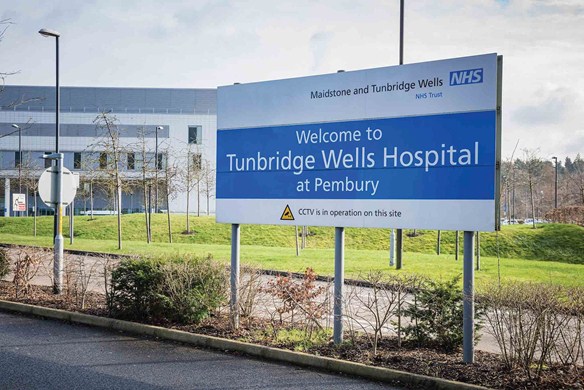A RECOVERY UNIT at Tunbridge Wells Hospital has had to be drafted in as back-up this winter because of the number of patients seeking emergency treatment over the last two months.
The ward is usually reserved for those who have undergone operations. The hospital at Pembury has also transferred most of its planned surgery to its sister site at Maidstone.
The decision to move the majority of its ‘elective activity’ was taken before the winter began in order to ‘reduce the number of patients cancelled on the day of surgery’.
The NHS has seen a spike in demand because of illness caused by the cold weather, such as influenza, which places stress on the hospitals’ capacity.
Elective procedures are those that are booked in advance and do not involve a medical emergency or require urgent treatment. Typically this includes joint replacements, cataract removal and all cosmetic treatments.
A spokesperson for Maidstone & Tunbridge Wells NHS Trust [MTW] told the Times: “As part of our Winter Plan to manage the care of our patients in a safe way, we are carrying out more of our planned procedures at Maidstone Hospital.
“This enables us to better use our facilities at Tunbridge Wells Hospital to care for high levels of emergency patients, which have been seen both locally and nationally.
‘This area is only used during times of significant emergency demand to support patient flow through our emergency departments’
“At times, this includes using our theatre recovery areas, as an in-patient facility, which are fully equipped to care for patients.”
Recovery units allow patients to have a short period of close monitoring immediately after surgery before returning to a bed or being discharged to go home.
The Trust said: “This area is only used during times of significant emergency demand to support patient flow through our emergency departments.”
The unit has been used for this purpose since the start of January but it is ‘flexed up and down according to need on a daily basis’.
The Trust aims to stop the arrangement at the end of this month.
The ward has 21 beds, with up to 17 of them being used at any one time. A limited number of operations continued to be carried out at Tunbridge Wells and were ‘not impacted by the use of these recovery areas’.
MTW said it experienced ‘high levels of demand’ over Christmas and New Year, and on January 2 every hospital in the UK was cleared to cancel all non-urgent surgery in order to free up hospital beds.
In a highly controversial move, the West Kent Clinical Commissioning Group’s postponed or cancelled all non-urgent operations for up to 102 days at the start of last year to save money.
Over a 12-month period up to last April, MTW cancelled 521 surgeries for non-clinical reasons on the day a patient was due to arrive, after they had arrived or on the day of their operation.
This compares with a figure of 362 over the previous year, while between April and September 2016 there were 170 cancellations – though the figures will increase over the winter months.
If an operation is cancelled, the hospital has to reschedule within 28 days. In 2016-17 MTW failed to meet this deadline on 25 occasions, according to figures released by NHS England.
Survey launched to find location for stroke unit
THE hospital in Pembury could receive a hyper acute stroke unit to speed up treatment times.
Tunbridge Wells Hospital is one of five being considered in Kent by the NHS for the enhancement, which offers a 24/7 response.
Last week a public consultation began to help health chiefs decide which three of the five should be chosen to ensure all county patients would not be too far from care.
Darent Valley Hospital, Medway Maritime Hospital, William Harvey Hospital and Maidstone Hospital are also being considered.
The consultation runs until April 13 and can be viewed at www.kentandmedway.nhs.uk/stroke








